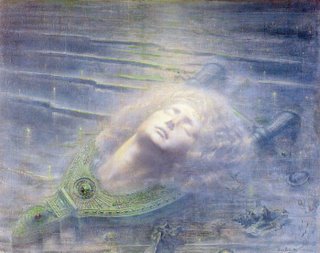Who can give lovers laws? (Boethius)
Orphée, Jean Delville, 1893.

Orpheus, king of the Ciconians, is counted among the Argonauts. Orpheus practised minstrelsy and by his songs moved stones and trees, holding also a spell over the wild beasts. He descended to the Underworld in order to fetch his dead wife, but had to return without her.
Mystic minstrel loses his wife
Orpheus, whom Apollo taught to play the lyre, travelled to Egypt where he increased his knowledge about the gods and their initiatory rites, bringing from that country most of his mystic ceremonies, orgiastic rites, and his extraordinary account of his descent to the Underworld. Orpheus became famous because of his poems and his songs, excelling everyone in the beauty of his verse and music. He also reached a high degree of influence because he was believed to have discovered mysteries, purification from sins, cures of diseases, and means of averting divine wrath. Some say that Orpheus introduced a cult of Dionysus that was very similar to the cult of Osiris, and that of Isis, which resembles the cult of Demeter. But others affirm that he praised all the gods except Dionysus.
The Aeginetans worshiped Hecate, and in her honor celebrated every year mystic rites which, they said, had been taught to them by Orpheus. And the Lacedaemonians asserted that it was Orpheus who had taught them the cult of Demeter Chthonia (of the Lower World).Orpheus married Eurydice 5, but she, while strolling through the grass with a group of naiads, was smitten in the ankle by a serpent, which shot its poison into her body and killed her.
Having mourned her to the full in the upper world, Orpheus decided to fetch her, and for that purpose he descended to Hades through the gate of Taenarus.Having descended to the Underworld, Orpheus accompanied his words with the music of the lyre, and it is told that not only the spirits wept but that also the erinyes were wet with tears. He also entranced Persephone by his songs, and persuaded her to help him in his desire to bring back to life his dead wife. And so even Hades himself was persuaded to let her go.
Orpheus loses his wife again
However, the god promised to do so only if on the way up Orpheus would not turn round until he came to his own house. But thoughtless Orpheus forgot, and when he turned round and looked at his wife, she instantly slipped into the depths again. In this manner Orpheus lost her a second time.
Some read the story thus:
"To you this tale refers,
Who seek to lead your mind
Into the upper day;
For he who overcome should turn back his gaze
Towards the Tartarean cave,
Whatever excellence he takes with him
He loses when he looks on those below."
Boethius, Consolation of Philosophy 3.52
Some have thought that through his descent to the Underworld, Orpheus performed a deed full of courage inspired by love.

<< Accueil